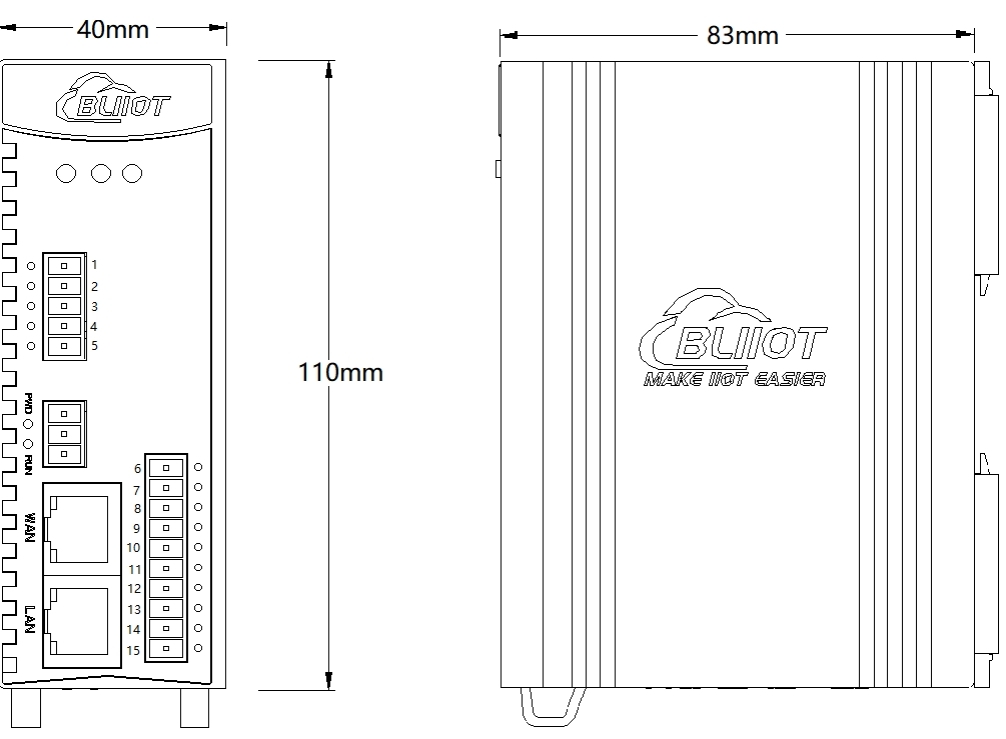IoT Applications
BLIIoT| New Version BL120AC Air Conditioner to Modbus Conversion
Views : 3231
Author : Luvia
Update time : 2024-03-13 17:31:00
Introduction
To implement the Air Conditioner to Modbus protocol, you typically need a gateway device that converts the proprietary communication protocol of the air conditioner into Modbus-compatible data. The gateway acts as a bridge, translating the air conditioner's data into Modbus registers or coils that can be understood by other Modbus devices.
There are different variations of the Air Conditioner to Modbus protocol, depending on the manufacturer and model of the air conditioner. Some common protocols used include Modbus RTU and Modbus TCP/IP.
Product Description
BL120AC air conditioner to Modbus gateway is a device that allows communication between an air conditioning system and a Modbus network. It serves as a bridge between the two systems, enabling data exchange and control.
BL120AC typically interfaces with the air conditioner using its proprietary protocol, translating the data into the Modbus protocol understood by other devices on the Modbus network. It can convert various parameters such as temperature, humidity, fan speed, and operating modes into Modbus registers or coils.
By connecting the air conditioner to a Modbus network, you can integrate it into a larger building automation system or supervisory control and data acquisition (SCADA) system. This enables centralized monitoring, control, and coordination of multiple HVAC systems, leading to improved energy efficiency and easier management.
Product features
1. Supports Modbus RTU, Modbus TCP, Air conditioner, etc.
2. Supports connection to up to 50 devices and collection of 4,000 data points.
3. Supports 6 RS232/RS485 optional inputs.
4. It adopts embedded ARM MCU and is a product developed based on Linux OS system.
5. 2 Ethernet ports (WAN port and LAN port).
6. Support 4G, WiFi, GPS.
7. Support OpenVPN, SNMPV1/V2.
8. It supports routing functions and cascade switch data collection to facilitate the collection of more industrial equipment data. The software has complete functions and covers most common application scenarios.
9. It integrates the humanized configuration interface that BLIIoT adheres to, as well as remote configuration, remote firmware upgrade and other functions. Users only need to make simple settings.
10. It adopts a fastening structure and has a power supply design with anti-reverse connection protection.
11. It adopts BLIIoT's patented rail buckle technology and supports standard DIN35 rail installation and wall-mounted installation.
Product Design

Model List
Application
By integrating an air conditioner with a Modbus network, you can achieve centralized monitoring, control, and coordination of multiple HVAC systems, leading to improved energy efficiency and streamlined management.
To implement the Air Conditioner to Modbus protocol, you typically need a gateway device that converts the proprietary communication protocol of the air conditioner into Modbus-compatible data. The gateway acts as a bridge, translating the air conditioner's data into Modbus registers or coils that can be understood by other Modbus devices.
There are different variations of the Air Conditioner to Modbus protocol, depending on the manufacturer and model of the air conditioner. Some common protocols used include Modbus RTU and Modbus TCP/IP.
Product Description
BL120AC air conditioner to Modbus gateway is a device that allows communication between an air conditioning system and a Modbus network. It serves as a bridge between the two systems, enabling data exchange and control.
BL120AC typically interfaces with the air conditioner using its proprietary protocol, translating the data into the Modbus protocol understood by other devices on the Modbus network. It can convert various parameters such as temperature, humidity, fan speed, and operating modes into Modbus registers or coils.
By connecting the air conditioner to a Modbus network, you can integrate it into a larger building automation system or supervisory control and data acquisition (SCADA) system. This enables centralized monitoring, control, and coordination of multiple HVAC systems, leading to improved energy efficiency and easier management.
Product features
1. Supports Modbus RTU, Modbus TCP, Air conditioner, etc.
2. Supports connection to up to 50 devices and collection of 4,000 data points.
3. Supports 6 RS232/RS485 optional inputs.
4. It adopts embedded ARM MCU and is a product developed based on Linux OS system.
5. 2 Ethernet ports (WAN port and LAN port).
6. Support 4G, WiFi, GPS.
7. Support OpenVPN, SNMPV1/V2.
8. It supports routing functions and cascade switch data collection to facilitate the collection of more industrial equipment data. The software has complete functions and covers most common application scenarios.
9. It integrates the humanized configuration interface that BLIIoT adheres to, as well as remote configuration, remote firmware upgrade and other functions. Users only need to make simple settings.
10. It adopts a fastening structure and has a power supply design with anti-reverse connection protection.
11. It adopts BLIIoT's patented rail buckle technology and supports standard DIN35 rail installation and wall-mounted installation.
Product Design

Model List
| Model | WAN | LAN | COM(Default: RS485; RS232 Optional) | WiFi | 4G | GPS |
| BL120AC | 1 | 1 | 2 | × | × | × |
| BL120ACL | 1 | 1 | 2 | × | √ | × |
| BL120ACLG | 1 | 1 | 2 | × | √ | √ |
| BL120ACW | 1 | 1 | 2 | √ | × | × |
| BL120ACP | 1 | 1 | 6 | × | × | × |
| BL120ACPL | 1 | 1 | 6 | × | √ | × |
| BL120ACPLG | 1 | 1 | 6 | × | √ | √ |
| BL120ACPW | 1 | 1 | 6 | √ | × | × |
Application
By integrating an air conditioner with a Modbus network, you can achieve centralized monitoring, control, and coordination of multiple HVAC systems, leading to improved energy efficiency and streamlined management.














